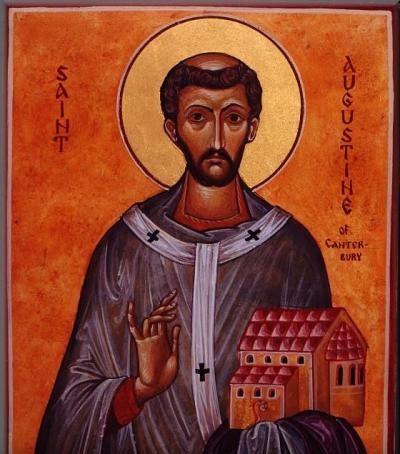
Saint of the Day for 27 May: St. Augustine of Canterbury
St. Augustine of Canterbury: Life, Mission and Impact on English Christianity.
Name
St. Augustine of Canterbury
Title
Bishop
Birth
Nov. 13, 534, Rome
Death
May 26, 604, Canterbury, England
Recurrence
27 May
Martyrology
2004 edition
Prayer
O Lord, who by the preaching and miracles of your blessed confessor and bishop Augustine, you deigned to enlighten the English nation with the light of the true faith, grant, we pray through his intercession, that the hearts of the erring may return to the unity of the true faith, and we may remain faithful to your holy will. So may it be
Roman Martyrology
In Canterbury, England, St. Augustine Bishop and Confessor, who, sent there with others by Blessed Gregory Pope, preached the holy Gospel of Christ to the English, and there, glorious in virtue and miracles, he rested in the Lord. His feast is celebrated on the twenty-eighth of this month.
The Saint and Mission
St. Augustine of Canterbury is a central figure in the history of English Christianity. Sent by Pope Gregory the Great at the end of the 6th century, his mission was to evangelize the Anglo-Saxon peoples. He tackled this task with great courage and faith, despite numerous difficulties and initial uncertainty. Arriving in England, Augustine found a complex spiritual terrain, but with determination and diplomacy, he succeeded in converting King Aethelbert and many of his subjects to Christianity. This event marked the beginning of the Christianization of England, a process that would profoundly transform the country. Augustine established the episcopal see in Canterbury, founding the first church and laying the foundation for the ecclesiastical organization of the region. His mission was not only spiritual but also cultural, bringing with him Roman influences that contributed to the development of Anglo-Saxon society. His work was not limited to conversion, but also included training local clergy and building religious structures that would ensure the spread of Christianity. St. Augustine of Canterbury is remembered not only as a great evangelist, but also as a man of great wisdom and vision, whose impact is still felt today in the English Church and beyond.
The Saint and Mercy
St. Augustine of Canterbury is an example of how mercy can guide a mission of spiritual and cultural transformation. His compassion toward the Anglo-Saxon peoples manifested itself not only in his preaching but also in the way he dealt with the challenges of his mission. With great patience and understanding, Augustine strove to build bridges between pagan and Christian cultures, showing deep respect for local traditions as he introduced the principles of the Gospel. Augustine’s mercy was also reflected in his pastoral leadership. Instead of imposing himself with authority, he sought to lead by example and love, helping new converts understand and live out their faith authentically. His ability to forgive and find peaceful solutions to conflicts demonstrated a practical mercy rooted in imitating Christ. His merciful approach not only facilitated the conversion of King Aethelbert and his court, but also the birth of a local church that could thrive independently. St. Augustine of Canterbury reminds us that true Christian mission is always steeped in mercy, embracing and transforming, building communities founded on love and mutual understanding.
Hagiography
The year 596 was turning when the Saxons, Angles and Jutes, pagan Germanic peoples, drove out the Bretons and occupied present-day England. Angli sunt? Angeli fiant!” said St. Gregory the Great. Unable to go there himself having ascended to the Pontificate, he chose a gallant handful of his Benedictine monks and…
